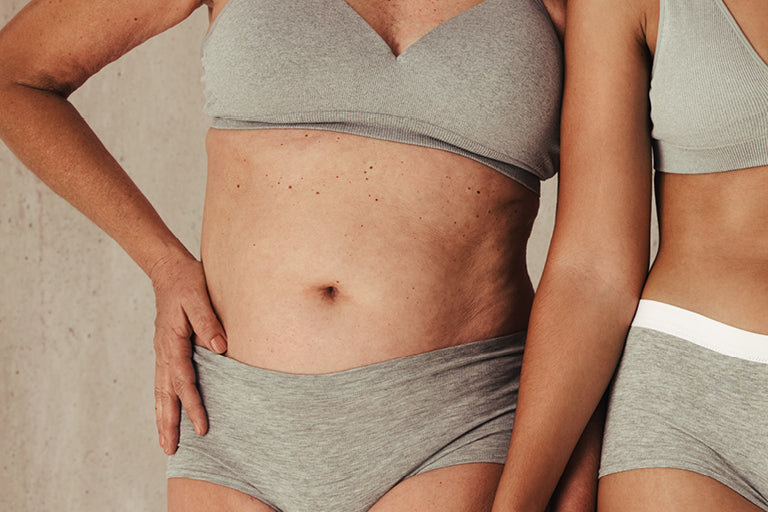It should come as no momentous surprise to learn most of us pile on a few pounds as we get older. According to research by the Agency for Healthcare Research and Quality this weight tends to increase progressively – a pound or two every year – as we enter middle age. On top of this, it has been shown that women put on an average of five pounds as they go through the menopause (which usually occurs between the ages of 45 and 53). What also happens around this time is that fat starts to be stored differently around the body. Typically, before menopause women tend to carry more fat around their hips and thighs but as levels of oestrogen begin to decline, one of the side effects of this is that fat then tends to settle disconcertingly around your belly – leading to the infamous ‘menopause belly’, ‘meno-middle’, the ‘meno-pot’ or ‘meno-belly’. The question is, is menopause entirely to blame for this? Increasing research suggests it might not be exclusively but it is linked to changes in your body composition, the health of your gut microbiome and how you metabolise sugar and fat – but your lifestyle and age are also a big part of the equation.
What causes menopause belly?
There are a range of factors that affect the size, flatness and firmness of your stomach, including genetics and your diet and lifestyle, but around the time of the menopause these can also include:
-
-
- Dealing with perimenopause/ menopause symptoms. Many women head into perimenopause (the lead up to menopause which on average happens for most women around the age of 46) and menopause experiencing symptoms like low mood and tiredness which can make it harder to stick to a healthy diet and exercise regime. Around this time in your life you might also start a family and this can radically alter your priorities and the time you have to yourself. You might also be caring for an elderly parent or other relative whilst also being busy with your career and very likely doing this sitting down in front of a computer all day. Increasingly, many of us then spend our leisure time scrolling through social media or looking at stuff online. The stress of work and life can also lead you to produce more of the stress hormone cortisol (see more below) which in turn increases levels of the hunger hormone ghrelin – so you may be prone to eat more.[1] We also tend to drink more alcohol as we get older (statistics from the charity Drinkaware show those aged 55-64 are more likely to drink more than those aged 16-24)[2] and alcohol contains a lot of sugar and mainly empty calories – so that regular evening tipple can soon translate into a couple more inches around your waist. . Research has found that women going through the perimenopause and those who have gone through menopause also have higher amounts of potentially dangerous visceral fat.[3]
- A drop in testosterone during menopause can also affect how much fat you carry around your middle. This is the hormone responsible for, among other things, muscle mass/strength and fat distribution – basically lower testosterone means you are more likely to gain fat around your belly and your body becomes less efficient at burning calories.[4] There are a range of foods which can help support your body in increasing testosterone
- Muscle loss. The amount of lean tissue we have starts to decline by up to 8% per decade after the age of around 30.[5] You’re also likely to lose muscle if you are less active than you once were and/or maybe find it harder to exercise because of a health condition (joint pain is one of the most common symptoms of menopause and this can impact on your motivation and ability to exercise) or injury. Why this is significant is because lean muscle burns more calories than fat, even when you are inactive. This means unless you are doing heavy manual work on a daily basis and/or regularly working out with weights to maintain and build that muscle, you’ll probably need to eat and drink less than you once did in order to avoid piling on the pounds.
- Metabolism. Any decrease in muscle mass is likely to slow your metabolism and reduce the number of calories you burn so if you can’t understand why you are putting on weight when you are not eating any more than you used to and are regularly exercising – this is probably why.
- Changes to your gut microbiome. Research exploring how menopause affects the gut microbiome is largely in its infancy, but studies on animals suggest declining levels of oestrogen appear to alter the delicate balance of beneficial gut bugs in your GI tract and are associated with increased fat, a decreased metabolic rate and insulin resistance (which can result in excessive sugar in your blood, leading to blood sugar peaks and crashes followed by tiredness and hunger) – all of which may contribute to you putting on weight.[6]
- An increase in cortisol. When you are stressed – physically or mentally – your adrenal glands pump out the stress hormone cortisol to help you handle that stress.[7] In the short term this is a helpful physiological response. Long term, however, it can lead to a cortisol imbalance which can lead to food cravings, weight gain, sleep problems and digestive issues as cortisol’s function in the body is to help manage blood sugar, reduce inflammation in the body, regulate blood pressure, your sleep-wake cycle and memory.[8] We also know that as oestrogen declines during menopause levels of cortisol rise. Add to this the fact that stress results from the very symptoms of menopause itself (like random hot flushes, the inability to sleep well, changes to your body and brain fog that make it hard to focus) and you can see how managing cortisol can become an increasing concern. There is also research linking chronic or sustained stress to high levels of cortisol which appears to play a role in us craving high calorie ‘comfort’ foods – leading to an increase in belly fat.[9] Read more here for ways to cope with stress and anxiety during menopause.
-
Is the meno-belly a health risk?
While putting on a few pounds might not necessarily have a hugely detrimental effect on your health, if it is allowed to creep up and is left unchecked you are not only likely to feel more self-conscious and less confident about your body but you also increase your risk of some serious health conditions including type 2 diabetes and osteoarthritis. Fat that accumulates around your belly is known as visceral fat and this is potentially problematic because it gets stored within your abdominal cavity and surrounds your organs. A study from 2021 published in the journal Menopause confirms that menopausal weight gain puts you at a greater risk of cardiovascular disease.[10]
How to get rid of menopause belly
It is not a foregone conclusion that you will develop a meno-belly and there is plenty you can do to reduce the risk of it happening and/or to help you lose some weight if you need to including;
Eat smaller but better
As our metabolism slows down so we burn fewer calories.[11] It makes sense then to keep an eye on your portion sizes and cut down on foods more likely to make you put on weight. Reducing your intake of refined carbohydrates, like white bread, pasta, cakes, biscuits and pastry, for example, has been linked to a reduced risk of postmenopausal weight gain.[12] The key is to eat smaller portions of foods that are more nutritionally dense like protein in the form of oily fish, eggs, lean chicken or beef, nuts, pulses or tofu. Eating a small amount of protein with each meal or snack is known to keep you feeling fuller for longer and you are less likely to snack on unhealthier quick energy fix sugary or fatty foods. Eating whole grains like brown rice, whole-wheat pasta, quinoa and oats also appears to be beneficial: in one study carried out on people between the ages of 40-65, including postmenopausal women, the ones who ate whole grains as opposed to refined ones (like white processed bread, white rice, white pasta) burned more calories and excreted more fat.[13] But rather than thinking in punitive terms about what you can’t eat maybe start thinking of what you can eat more of – like vitamin-packed fruit and veg. Fruit and veg is not only low in calories it is also high in fibre which can help create a thriving gut microbiome which is linked to maintaining a healthier weight. For more information about what foods can help read Nutritionist Helen Roach’s Diet and recipes to help balance hormones during menopause.
Create a thriving gut microbiome
Getting a rich and diverse balance of microbes in your gut can help you to become not just healthier but potentially slimmer too. Interestingly, overweight and obese people tend to have less diverse gut bacteria than those who are a healthy weight and they also put on weight more easily. Creating and maintaining a healthy and diverse balance of beneficial gut bacteria should not only help improve your digestion, immunity and mental health but should also improve your energy, metabolism and ability to maintain a healthy weight. Nutritional experts and GI specialists suggest the key to creating a flourishing and diverse balance of gut microorganisms is to eat as diverse a range of foods as you can. Plus eat minimum amounts of processed foods, cut back on sugar, eat more vegetables and fruit and fibre, consume plenty of plant based foods and drinks (not just vegetables and fruits but also seeds, nuts, herbs, spices, even coffee and tea – in short, anything that is derived from a plant source) and include healthy fats like extra virgin olive oil and sources of protein like fish, chicken, pulses and/or tofu. Use the Mediterranean diet as a template for a menopause-friendly/meno-belly busting way of eating.
Include prebiotics and probiotics
Including prebiotic and probiotic foods in your diet have also been shown to be particularly beneficial in encouraging a healthy gut microbiome and may even reduce the calories you absorb from food resulting in lower body weight and fat percentage.[14] Prebiotics are found in foods like onions, garlic, leeks, Jerusalem artichokes, oats and berries and are said to act like a kind of ‘fertiliser’ that feed the friendly bacteria in your gut. Probiotics are live bacteria that are found in certain foods (including live unsweetened yogurt, kefir – a fermented yogurt drink, sourdough bread and fermented foods and drinks like sauerkraut and kombucha) and nutritional supplements. Significantly, several studies suggest probiotics can help you to lose both weight and belly fat. In one study obese postmenopausal women were given either a daily low dose probiotic supplement, a high dose probiotic supplement or a placebo for three months. At the end of the 12 weeks those in both the low dose probiotic group and the high one found that their waist size had been reduced and they had less fat, including subcutaneous or visceral fat. Greater benefits were seen in those taking the higher probiotic doses.[15] There is increasing focus on the bacteria strain Lactobacillus plantarum found in some probiotic supplements – preliminary research on animals suggests is could possibly enhance memory and reduce anxiety.[16] Others suggest having low levels of this strain of microorganism can make it harder to lose weight. Lactobacillus plantarum can be found, alongside many other live cultures and nutrients, in Health & Her Menopause Biome – Live Cultures Supplement.
Consider how you eat
In our 24/7 culture it can be tempting to eat on the run and wolf down something quickly to save time but there are studies to show that eating fast causes you to feel hungrier and eat more in the long run.[17] Similarly, having your meals in front of the telly has been linked to putting on more weight than those who don’t watch tv according to research published in the journal Obesity.[18] Also the temptation when you have put on weight is to eat very little in the hope the weight will fall off. This can be counter-productive however because if your body doesn’t get the calories it needs it goes into survival mode and actually starts to burn less energy by lowering your metabolic rate. In other words, it becomes even harder to lose weight and this is liable to make you feel miserable and more inclined to comfort eat and drink.
Drink less.
A glass of wine typically contains between 135 and 200 calories. You can see how that can rack up the calories over time so ideally have at least a few nights off the booze and/or look for lower calorie tipples like gin or vodka with low calorie tonic (around 115 calories a glass) or no alcohol alternatives. And it is not just the calorie counts of these tipples that is the only concern – and when we have been drinking we tend to make less healthy food choice and possibly eat more. You can find more on how does drinking affect menopause? here.
Keep moving
What is important at this stage of life is to try and preserve your muscle mass and your calorie burning potential by doing exercises using free weights, weight machines, resistance bands or your own body weight (like squats, lunges, sit-ups or The Plank). This type of exercise should also help to improve your flexibility, mobility, strength and endurance. Do this in conjunction with regular aerobic exercise like walking, jogging, swimming or cycling and you should keep your weight down and your muscles firmer. Just keep moving as much as possible – doing things as simple as standing and pacing when you are on your phone or taking regular walking breaks if you are sat at a computer all day will help. Research shows prolonged sitting is linked to higher levels of abdominal fat.[19]
Find effective stress relievers
Stress affects us all differently and whilst some people lose their appetite and shed weight, others find they comfort eat and put it on. Researchers have confirmed that increases in the stress hormone cortisol are linked to weight gain as your adrenal glands release adrenaline and cortisol which triggers glucose to be released into your bloodstream (this is a result of the ‘fight or flight response’ – giving you the energy you need to escape a stressful situation). This physiological response can cause sugar cravings.[20]
Get enough sleep
Not getting enough sleep can seriously sabotage your best efforts to get fit and/or lose weight and has been linked to making poorer food choices, consuming more calories than you need and reduced fitness levels.[21] If you wake up feeling tired you are less likely to feel like exercising and the more exhausted you feel the more likely you are pick sugary and/or fatty foods to give you a quick blood sugar high (followed by a crashing slump that can leave you feeling drowsy during the day). There is also evidence to show if you eat a diet high in sugar you tend to sleep less deeply and are more restless and wake more at night due to the stimulating effects of the sugar.[22] Recent research has also found that not getting enough sleep can lead to blood sugar spikes after breakfast the next morning. As a blood sugar spike is invariably followed by a blood sugar slump this could increase how much you eat during the day.[23] There is also evidence to suggest a lack of sleep can reduce the beneficial bugs in your gut.[24] Here is why menopause makes you tired.
Camouflage it
If you do feel self-conscious about your belly, stylist and dressmaker Gilly Woo has a range of tips and tricks to help in How to look and feel fabulous whatever your waist size.
Be realistic
Ultimately, putting on weight and/or developing a menopause tummy is not an inevitable side effect of menopause but conversely it is not healthy to fixate on trying to stick to the weight or shape you were at 18 either. You can be in great shape, fit, healthy and not overweight going through the menopause but your dwindling hormones do make it more likely that you might have a very small layer of extra fat sitting around your middle and you will probably find it harder to achieve an ultra-defined six pack. That is not, however, to say it is impossible.
Sources and Resources
[1] https://pubmed.ncbi.nlm.nih.gov/30714236/#:~:text=Abstract,aimed%20at%20attaining%20homeostatic%20balance
[2] https://www.drinkaware.co.uk/research/alcohol-facts-and-data/alcohol-consumption-uk#:~:text=In%202019%2C%2057%25%20of%20adults,compared%20to%2015%25%20of%20females
[3] https://joinzoe.com/learn/menopause-weight-gain
[4] https://www.healthline.com/nutrition/testosterone-and-fat-loss#:~:text=Summary%3A%20Low%20testosterone%20levels%20reduce,promote%20weight%20gain%20over%20time.
[5] https://www.ncbi.nlm.nih.gov/pmc/articles/PMC2804956/#:~:text=Muscle%20mass%20decreases%20approximately%203,to%20disability%20in%20older%20people
[6] https://pubmed.ncbi.nlm.nih.gov/33235036/
[7] https://www.pardigm.com/articles/what-is-cortisol
[8] https://www.everydayhealth.com/cortisol/guide/
[9] https://onlinelibrary.wiley.com/doi/full/10.1002/oby.21733
[10] https://journals.lww.com/menopausejournal/Abstract/2021/06000/Abdominal_visceral_adipose_tissue_over_the.6.aspx
[11] https://www.cambridge.org/core/journals/journal-of-nutritional-science/article/lower-resting-and-total-energy-expenditure-in-postmenopausal-compared-with-premenopausal-women-matched-for-abdominal-obesity/AE8AD0A864F72A9B5D34D482A714E6CA
[12] https://www.ncbi.nlm.nih.gov/pmc/articles/PMC5728369/
[13] https://academic.oup.com/ajcn/article/105/3/589/4637849
[14] https://onlinelibrary.wiley.com/doi/full/10.1111/obr.12626
[15] https://pubmed.ncbi.nlm.nih.gov/29914095/
[16] https://www.ncbi.nlm.nih.gov/pmc/articles/PMC6412773/
[17] https://www.ncbi.nlm.nih.gov/pmc/articles/PMC3253303/
[18] https://pubmed.ncbi.nlm.nih.gov/27030406/
[19] https://onlinelibrary.wiley.com/doi/full/10.1002/oby.22034
[20] https://www.orlandohealth.com/content-hub/how-too-much-stress-can-cause-weight-gain-and-what-to-do-about-it
[21] https://www.sleepstation.org.uk/articles/insomnia/sleep-and-weight-gain/
[22] https://pubmed.ncbi.nlm.nih.gov/26156950/
[23] https://joinzoe.com/learn/menopause-weight-gain
[24] https://www.sciencedaily.com/releases/2019/10/191028164311.htm



